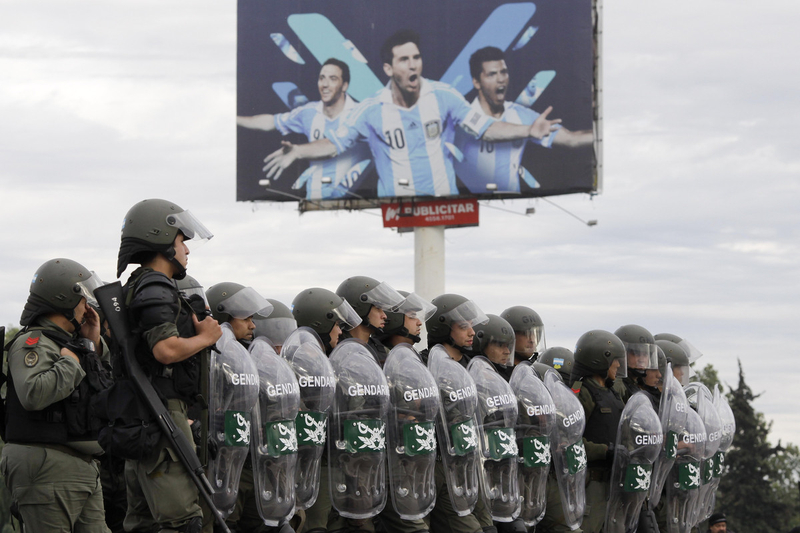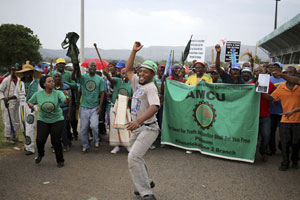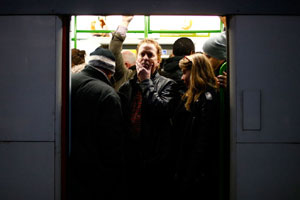 |
|
Riot police stand near a billboard of Argentine soccer players while monitoring a demonstration that blocks the Panamerican highway leading to Buenos Aires, Argentina, April 10, 2014. [Photo/icpress.cn] |
BUENOS AIRES _ A nationwide strike paralyzed Argentina's economy on Thursday, shutting down air, train and bus traffic, closing businesses and ports and emptying classrooms.
The strike also stopped all non-emergency hospital attention, left garbage in emptied streets and complicated many other aspects of life in the South American nation.
Labor leaders want higher pay, lower taxes and millions of dollars they say are owed to union-run health care providers. The government disputes this debt to the funds, which the unions lost total control of after being accused of misusing the money.
All Argentines are struggling with 30 percent inflation, but any money for pay raises has to come from somewhere, and analysts say the economy has almost stopped growing for lack of confidence in the country's future.
Many worry that President Cristina Fernandez, who rules with decree power over many aspects of Argentina's economy, is squeezing the middle class by raising taxes and fees and cutting subsidies as she seeks funds to appease the unions and other sectors that could threaten her government.
Fernandez was dismissive of the strike.
"If everything is going so badly, who are these thousands and thousands of Argentines I see in the capital, when no restaurant has any empty seats?" she challenged.
But a survey of 450 people last week found 62 percent agree that the president is "really losing control of things," the Polldata firm reported.
"We have to think it over 25 times before going out to eat," Maria Eugenia Diez, a middle-class housewife, complained in an Associated Press interview.
She said she's sympathetic to the union workers' salary woes and supports many of the government's efforts to direct resources to the poor, but thinks the strike just takes more money from everyone's pockets. She's also deeply worried about how inflation is reducing everyone's power to spend, which keeps the economy going.
Her two boys lost nearly two weeks of school when public teachers struck last month, symptomatic of a society in trouble. Years have passed since they've been able to save any money, and even though her husband's job as a software engineer seems stable, they drive a 30-year-old car and have cut sharply back on family spending, she said. ``I really worry that one day the inflation will be so steep that we won't be able to reach the end of the month.''
The 24-hour strike was called by the opposition branch of the nation's largest union conglomeration, which claimed that more than a million workers stayed home. If the government doesn't answer their demands, labor boss Hugo Moyano vowed more and longer strikes in the future.
Moyano was a close ally of Fernandez's late husband, President Nestor Kirchner, but he and Fernandez grew apart after he died in 2010, and many see Thursday's strike as only the latest power struggle between them.
Cabinet Chief Jorge Capitanich dismissed the strike Thursday as ``a huge blockade'' led by labor leaders who respond to Peronist Party politicians opposed to Fernandez.
Juan Carlos Schmid, who leads the dredgers and navigators' union, denied that, blaming barricaded streets on non-union leftist groups and saying that even pro-government unions joined the strike.
Union leaders who have held onto power for decades aren't very well liked by many Argentines _ even union members themselves, and even those who are already getting steep raises this year.
The strike depressed sales at the downtown candy and sandwich shop where Sebastian Gonzalez, 29, showed up to work on Thursday. His commerce workers' union already secured 27 percent pay raises this year, nearly matching inflation.
The strike "is not a good idea, because many people have to work, and I don't agree with stopping all transportation. It's a big blow from the labor sector, which as far as I'm concerned doesn't represent all the workers and protects its own interests."
Many Argentines are trying to adjust to utility hikes of as much as 500 percent as the government withdraws energy subsidies it has paid since the last economic crash in 2002. Rather than spending to keep water, gas and electricity low for people who can afford it, Fernandez's Economy Ministry wants to redirect that money to construction loans, university scholarships and cash welfare payments to the poor.
The constant price increases and a sharp devaluation in the peso in January set off hundreds of smaller protests before Thursday's national strike. In March alone, there were 656 street demonstrations, said Patricio Giusto, an analyst with the Diagnostico Politico consulting firm.
"Social pressures are heating up," he said. "It's a really high statistic and the trend is increasing. There are many salary negotiations that remain unresolved."
 |
 |
 |